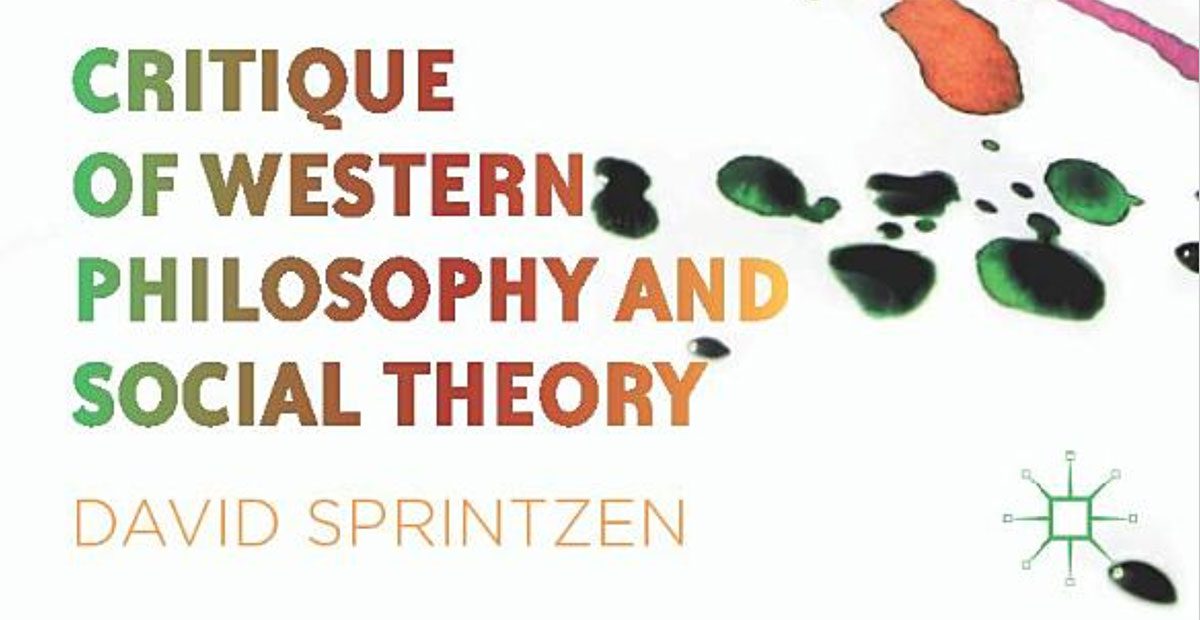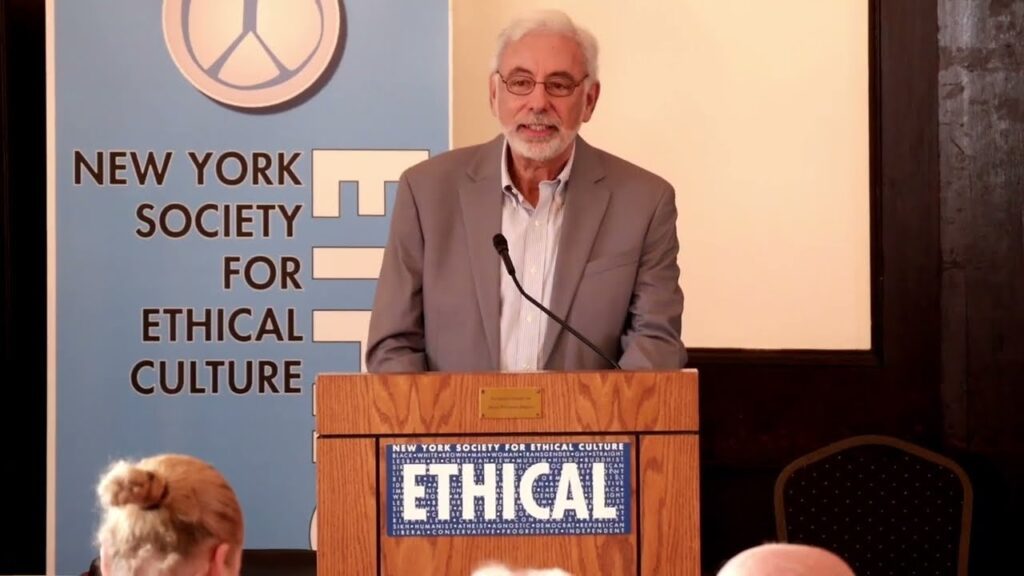
Leader Dr. Joe Chuman reviews Critique of Western Philosophy and Social Theory by philosopher David Sprintzen. David is a long-time member of the Long Island Ethical Humanist Society and retired from his position as professor of philosophy at Long Island University. Though his book does not reference it, Joe contends that David’s philosophy could serve as an updated foundation for contemporary Ethical Culture.
•••
David Sprintzen’s Critique of Western Philosophy and Social Theory, is a work bearing a prosaic title with broad ambitions. Published in 2009, the book is a hidden gem of philosophical analysis that presents a blueprint for the reconstruction of contemporary society.
Sprintzen is a Professor Emeritus of Philosophy at Long Island University and a life-long political activist, who founded, and for many years, chaired the Long Island Progressive Coalition. In this work the philosopher-activist brings his philosophical erudition to the fore while hinting at the practical applications of his philosophy for social policy.
Sprintzen, who has published two texts on the philosophy of Albert Camus, and is a scholar of the thought of the American philosopher, John Dewey, in this work is committed to nothing less than critiquing and reformulating the metaphysical underpinnings of modern society. His thought is wide- ranging, yet grounded in a unifying concept. His thesis focuses on the metaphysical mistakes that have shaped modern values and habits of thoughts. With the spirit of Dewey looking over his shoulder, Sprintzen contends that the cardinal error plaguing modern life is the atomization of things, ideas and experiences we engage. However differentiated and independent from one another phenomena appear, Sprintzen asserts that the fabric of reality is unified and all things at ulterior levels are interdependent.
We live within the context of mistaken paradigms, and Sprintzen’s ambition is to radically transform how we assess reality at its foundation. He states,
It is one of the central theses of this work that we are currently in the midst of a global cultural and metaphysical transformation at least equal in scope to that which began to transform the planetary culture four centuries ago. Our fundamental modes of thought and action, institutional structures, personal identity, economic development, and relation to nature, all require radical revision if human life on this planet (and beyond) is to survive and prosper…My task in this work will be both to critically evaluate the contours of that transformation and then to outline the structures of an alternative metaphysic and sketch a frame for the social and institutional order it suggests.
This, to say the least, is a comprehensive task, and it is not surprising that the author begins his treatise with the conflict between religious and scientific worldviews. To his credit, Sprintzen affirms that religion has played the necessary function of providing human beings with a sense of meaning and place in an otherwise absurd reality. We are mythopoeic beings who find meaning within narratives. The scientific revolution, emerging in concert with Protestantism, is at stark variance with religious explanations of reality, and has replaced them with alternatives, that while creating the foundations of modernity, have radically alienated us from nature and legitimated a worldview of isolated individualism, competition, unbridled capitalism and dominion over others. Implicit in Sprintzen’s project is the need to reconstruct a narrative that is updated and fitted to the empirical findings of our age.
Though he does not use the term, underlying Sprintzen’s metaphysics is the notion that reality is an organic unity, and viewing its constituent parts as independent entities separate from each other partakes of a false understanding and misconception that leads to disastrous consequences.
Sprintzen applies this analysis to a very broad range of phenomena, inclusive of subject-object dichotomies found in Aristotelian sentence structure and logic, Cartesian dualism, and Newtonian determinism leaving us wanting for purpose. Of greatest moment to the author is the mistake we make in asserting ontological individualism that situates the person outside of society and is blind to the thoroughgoing social dynamics which shape the person, including our subjective sense of individuality. Here Sprintzen finds an ally in Karl Marx’s observation that the human essence is “… the ensemble of the social relations.”
Individualism’s most powerful expression is deployed economically in the market, which by its own logic sees no higher gratification than the satisfaction of the isolated self. “To the extent that we view ourselves as essentially self-encapsulated individuals – the economist’s proverbial ‘economic man,’ for example, always looking out for ‘Number One’ – to that extent society is nothing but the practical instrument of a calculated strategy, of which other people are the present instruments and The Market the primary vehicle of social cohesion.”
Individualism is a species of reductionism, which is the fallacious paring down of complex realities into a single phenomenon or explanation. Sprintzen’s anti-reductionism takes him beyond the human realm into the field of quantum physics and Heisenberg’s uncertainty principle in which he finds validation for the emergence of new phenomena which a strict determinism or a notion of reality comprised of atomized parts cannot provide or explain. It is here that Sprintzen introduces the concept of “emergent phenomena” which are those “whose nature and operation cannot be completely explained by a description of the behavior of their constituent parts.”
Reality is complex and multilayered. Different systems function and can be explained according to their own laws. Yet the laws that explain phenomena within systems cannot provide an exhaustive explanation when systems intermingle or overlap. So, as Sprintzen notes, “…emergent phenomena are best thought of as themselves elements of emergent structures that express the unique organizational properties and powers of distinctive fields or levels of reality.” For example, “…gravity conditions life, and no life can violate gravitational laws, but gravity does not determine what living things do.” Or, to provide another example, “Language…requires brain cells to transmit electrical signals, but none of those cells have or understand language.”
It is the relations of these disparate systems that create “fields,” and the concept of fields is pivotal to Sprintzen’s metaphysics. Fields give rise to the semi-autonomous reality of emergent structures and also provide a resolution to what Sprintzen acknowledges as the so far intractable problem of the relation of freedom and determinism. To complete his analysis, Sprintzen discusses the complexity of consciousness, which also partakes of an analysis of fields. He notes,
Self-consciousness involves the capacity of an organism to be at the same time – in one unity act – both the subject and the object of its own awareness: to be an object “for itself.” We are thus confronted with a unique emergent field characterized by both irreducible subjectivity and sociality, neither of which furthermore, are reducible to the other. Consciousness is the subjective structure of that experience. Self-consciousness is the meaningful organization of that experience as it locates itself within its own meaning-field.
Our experiences are objectively knowable by others from the outside, but subjectively they remain private and unknowable. The objective standpoint tells us nothing about the subjective meaning, intent, or even the likely behavior of the emergent experience viewed subjectively.
The reality of systems in relation to each other gives rises to fields such that this broader reality is not explicable or reducible to the constituent elements in any system alone. This understanding opens us up to the emergent, the new, and, in regard to consciousness, freedom. It also serves as the basis of a fresh metaphysical understanding that should guide our thinking as we move ahead.
With his approach that refutes determinism and reductionism across the entire range of phenomena – physical, social and cognitive – Sprintzen claims “…to suggest the fundamental inadequacy of that classical way of thinking – first systematized by Aristotle more than 2,300 years ago and which has dominated Western thought ever since – and to offer a conceptual frame for an alternative frame with which to replace it.”
Before hinting at the practical applications of Sprintzen’s metaphysical reconstruction, I think it is most useful to briefly return to his discussion of the fallacy of individualism and the contrasting social nature of the human person. Here the author is at his most demonstrative. He begins his chapter on “The Webbed Self,” with a virtual rallying cry, “By now one thing should be totally clear: individualism is a theoretically untenable and socially destructive doctrine. It might well be called the social disease of modernity, completely mangling any capacity to understand the process by which society produces and and nurtures individuals into adulthood.” For Sprintzen, individualism is “…simply the atomism of the social world…” The target of Sprintzen’s ire is rendered transparent when he says, “It (i.e. individualism) serves as a narrow justification for a narrow self-seeking (often profit-maximizing) egoism.”
Despite the ontological fallacy of individualism, Sprintzen, nevertheless, acknowledges its profound historical role as a liberatory propaganda tool in transforming static, class bound, repressive societies and freeing persons from lives of perpetual misery at the hands of autocrats. Yet he claims that the historical function of individualism should not be mistaken for its theoretical adequacy. Nor should we deny its disastrous consequences as we move forward.
In discussing the mistake of the individual as prior to and over against society, the author makes the critical distinction, as implied earlier, between individualism as an ontological category and the moral value of individuality as a quality of character. Here he explicitly borrows from the thought of John Dewey and invokes Martha Nussbaum’s approbation of human flourishing as among the most worthy of social goals. Indeed it is society that gives birth to individuality and is one of society’s most valued purposes.
Here I find an omission in Sprintzen’s treatment of individualism. As a student of human rights and a staunch defender of civil liberties it seems to me that Sprintzen’s critique of individualism would merit discussion of the rights tradition in the West. Liberal democracy, which no doubt he supports, requires both democratic elections as well as respect for rights held by individuals. Ontological individualism as a basis for rights has a long pedigree most powerfully articulated by luminaries of the Enlightenment such as Thomas Hobbes, John Locke, and Immanuel Kant. In more recent times, there has been debate about the foundation of human rights including arguments demonstrating how humanity, possessed by individual persons, gives rise to rights. Sprintzen’s thesis, which denies the independent status of individualism removed from our social natures, would be strengthened by interrogating the position defended by these classic figures, a mainstay of political philosophy, which many maintain is a prerequisite for a free, democratic society.
As he moves toward toward conclusion, Sprintzen applies his metaphysical analysis to the state and future of American society. A commitment to individualism has lead historically to a belief in unbounded expansionism, especially of markets. But this dynamic has run its course and has been exhausted. Among the consequences are the retreat into privatization, the erosion of community and its consequent loneliness. We suffer from a “celebration of commodities,” a narrowing of meaning, purpose and hope, among other social ills.
Sprintzen’s solutions, as implied, are comprehensive. He provides the philosophical changes in vision that are necessary to provide for the survival and flourishing of the human future, without articulating specific policies. Again, his purpose is philosophical and only by extension political. He provides a map with the details to be filled in by others.
But his vision that emerges from his critique is clear, and there are hints of what society based on that vision would entail. We need a transformation of beliefs, practices, social institutions and personal character. Among the elements of his vision are the following: Economic activity should always be subordinate to the provision of the collective human well-being. Health care and social services shall be a right. Ecological sustainability, equity in the provision of basic necessities and racial and gender equality are required. Invoking Dewey again, we must employ intelligence and eschew outmoded ways of thinking to address our problems. But central to Sprintzen’s aspirations is a revival of democracy, most organically expressed through a reconstitution of neighborhood life. We must move away from exclusive emphasis on the private sphere and come to appreciate how purported private interests need to serve the public and the common good.
In conclusion, Sprintzen does not posit utopia but does open us up to possibilities. We require a renewal of ideals, a commitment to the emergent and the new in concert with a naturalistic ethic and the deliverances of science. He provides an assessment of our condition which is far reaching, profound and wise. His critique is radical and his vision humane.
David’s Sprintzen’s Critique of Western Philosophy and Social Theory lives up to its name. And those who choose to follow the thought of this very adept philosopher will be well rewarded.







